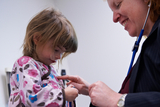
Children’s Hospital of Philadelphia (CHOP) is dedicated to ensuring your child receives the best care possible. Your primary care provider is always the first line of care for your child. The CHOP Care Network provides several ways to get medical care for your child when your pediatrician’s office is closed. The information below can help you decide the best place to go if your child is sick or injured. Making smart choices about where to get care can help keep emergency rooms available for families who need them most.
Primary Care/Urgent Care
Most of the symptoms listed below can be treated at home or with a call to your pediatrician. They can help you decide where to get care, whether that’s scheduling a sick visit, recommending a telehealth appointment, or referring you to an emergency department (ED).
Many ailments can also be managed by your pediatrician during normal office hours. If you need immediate assistance after hours, call your pediatrician’s office to speak to an after-hours nurse. If care can’t wait until your pediatrician’s office reopens, find an Urgent Care center near you.
- Allergic reactions (mild)
- Asthma flare-up (mild)
- Breathing trouble (mild)
- Broken bones (minor)
- Burns, cuts & bites (minor)
- Chest pain (mild)
- Cough and congestion
- COVID-19 testing for patients who meet testing criteria after being seen on-site
- Dehydration (mild)
- Dizziness
- Earache/ear pain
- Feeling faint
- Fever in children more than 2 months old
- Headache (mild)
- Head injury (minor)
- Rash
- Sore throat
- Stomach pain (mild)
Don’t forget: you are the best judge of your child’s needs. If your child has alarming symptoms or is in pain, don’t hesitate to seek emergency care.
Use this symptom checker for help determining how serious your child’s symptoms are, if a visit to the doctor is needed, and what steps you can take to relieve symptoms at home.
Watch this helpful video for more about managing your child’s fever.
Emergency Care
For these or other serious or life-threatening situations, go to the emergency department (ED) right away.
- Allergic reactions (severe, anaphylaxis)
- Asthma attack (severe)
- Bleeding that won’t stop
- Breathing trouble (severe)
- Broken bone (major, skin torn, bone out of place)
- Burns, cuts & bites (major, dog bites)
- Chest pain (severe)
- Dehydration (severe)
- Eye or facial injury
- Fainting (severe, abnormal behavior)
- Fever over 100.4°F in children under 2 months of age
- Headache (severe or prolonged)
- Head injury (major)
- Psychiatric emergency
- Seizure
- Stomach pain (severe)
- Swallowed button battery
Poisonings/Swallowed Objects
Call the Poison Control Center hosted at CHOP at 1-800-222-1222, and a specially trained nurse or pharmacist will assist you. This free hotline is available 24/7. *IMPORTANT: If you think your child swallowed a button battery, go to an ER right away.
COVID-19 Testing
For COVID-19 testing for your child, use the retail or public health sites in your community. This helps free up space in the ER for serious medical emergencies.
CHOP Doctors are Closer Than You Think
Did you know that CHOP doctors are on staff in the emergency departments and inpatient pediatric units at several community hospitals throughout the region? Kids have even more options to access the expert pediatric care they need, closer to their homes! See locations near you.
Children’s Hospital of Philadelphia (CHOP) is dedicated to ensuring your child receives the best care possible. Your primary care provider is always the first line of care for your child. The CHOP Care Network provides several ways to get medical care for your child when your pediatrician’s office is closed. The information below can help you decide the best place to go if your child is sick or injured. Making smart choices about where to get care can help keep emergency rooms available for families who need them most.
Primary Care/Urgent Care
Most of the symptoms listed below can be treated at home or with a call to your pediatrician. They can help you decide where to get care, whether that’s scheduling a sick visit, recommending a telehealth appointment, or referring you to an emergency department (ED).
Many ailments can also be managed by your pediatrician during normal office hours. If you need immediate assistance after hours, call your pediatrician’s office to speak to an after-hours nurse. If care can’t wait until your pediatrician’s office reopens, find an Urgent Care center near you.
- Allergic reactions (mild)
- Asthma flare-up (mild)
- Breathing trouble (mild)
- Broken bones (minor)
- Burns, cuts & bites (minor)
- Chest pain (mild)
- Cough and congestion
- COVID-19 testing for patients who meet testing criteria after being seen on-site
- Dehydration (mild)
- Dizziness
- Earache/ear pain
- Feeling faint
- Fever in children more than 2 months old
- Headache (mild)
- Head injury (minor)
- Rash
- Sore throat
- Stomach pain (mild)
Don’t forget: you are the best judge of your child’s needs. If your child has alarming symptoms or is in pain, don’t hesitate to seek emergency care.
Use this symptom checker for help determining how serious your child’s symptoms are, if a visit to the doctor is needed, and what steps you can take to relieve symptoms at home.
Watch this helpful video for more about managing your child’s fever.
Emergency Care
For these or other serious or life-threatening situations, go to the emergency department (ED) right away.
- Allergic reactions (severe, anaphylaxis)
- Asthma attack (severe)
- Bleeding that won’t stop
- Breathing trouble (severe)
- Broken bone (major, skin torn, bone out of place)
- Burns, cuts & bites (major, dog bites)
- Chest pain (severe)
- Dehydration (severe)
- Eye or facial injury
- Fainting (severe, abnormal behavior)
- Fever over 100.4°F in children under 2 months of age
- Headache (severe or prolonged)
- Head injury (major)
- Psychiatric emergency
- Seizure
- Stomach pain (severe)
- Swallowed button battery
Poisonings/Swallowed Objects
Call the Poison Control Center hosted at CHOP at 1-800-222-1222, and a specially trained nurse or pharmacist will assist you. This free hotline is available 24/7. *IMPORTANT: If you think your child swallowed a button battery, go to an ER right away.
COVID-19 Testing
For COVID-19 testing for your child, use the retail or public health sites in your community. This helps free up space in the ER for serious medical emergencies.
CHOP Doctors are Closer Than You Think
Did you know that CHOP doctors are on staff in the emergency departments and inpatient pediatric units at several community hospitals throughout the region? Kids have even more options to access the expert pediatric care they need, closer to their homes! See locations near you.
To help figure out how serious your child's symptoms are and what kind of care they need, use this online symptom checker to make informed decisions.
